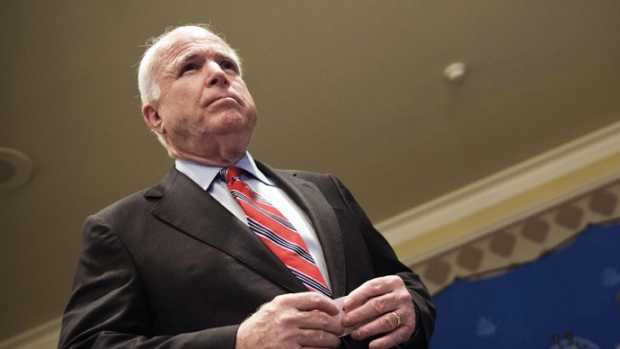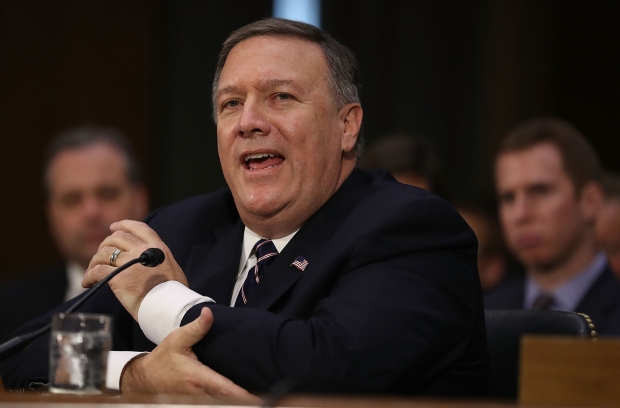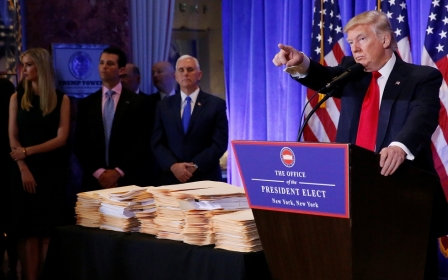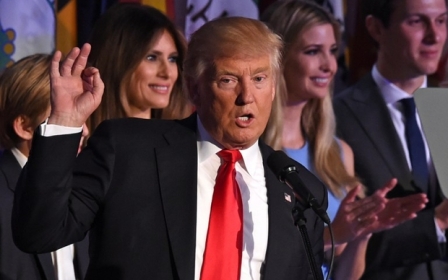'The capital of Israel is Tel Aviv': Trump's defence secretary nominee
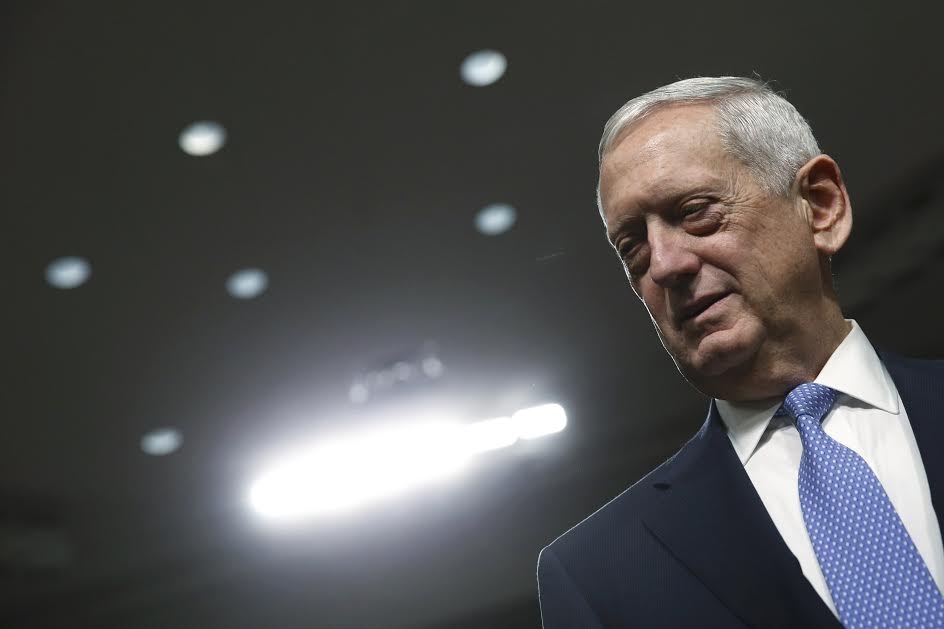
President-elect Donald Trump made moving the US embassy in Israel to Jerusalem a central point in his campaign. But his defence chief nominee said on Wednesday that the capital of Israel is Tel Aviv.
"Right now, I'd stick with the US policy," James Mattis told lawmakers when asked about moving the embassy to Jerusalem. "I would defer to the nominee of secretary of state on that, sir."
Palestinians want East Jerusalem as the capital of their state in any future negotiated settlement. But Israelis claim the entire city as theirs.
The retired Marine Corps general also expressed views on Russia and NATO that appeared contradictory to statements that Trump has made.
In response to a question by Republican Senator Lindsey Graham, Mattis said: "The capital of Israel that I go to, sir, is Tel Aviv, sir, because that's where all their government people are."
Iran threat
Mattis said he believes Iran is "the biggest destabilising influence in the Middle East", and that the US must be ready to confront Russian behaviour in areas where the two countries cannot cooperate.
He also said Iraq should not be allowed to become "a rump state of the regime in Tehran".
Still, he did not echo Trump's campaign threat to rip up a nuclear deal between Iran and world powers, under which Tehran agreed to curb its nuclear program in return for relief from economic sanctions. Mattis said the deal was imperfect but that the US should uphold it.
"When America gives our word, we have to live up to it," Mattis said.
The remarks by Mattis in written responses to questions from Congress - focused, however, on Russia, during a testy period for bilateral relations.
Russia
In a week when claims emerged that Trump has been compromised in his dealings with Moscow, Mattis's comments looked set to endear him to Russia-wary Republicans and Democrats on the Senate Armed Services Committee.
The US Senate overwhelmingly backed a waiver on Thursday that will allow Mattis to serve as secretary of defence, despite having retired as a Marine general in 2013.
The Senate voted 81 to 17 for a one-time waiver of a provision of a law on civilian control of the US military requiring a seven-year wait before active-duty military can lead the Department of Defense.
The waiver was also narrowly approved by the House of Representatives Armed Services Committee, but it still must pass in the full House, and be signed into law by the president, to allow Mattis to serve if he is confirmed to lead the Pentagon.
"We engaged with Russia even during the darkest days of the Cold War, and I support the president-elect's desire to engage with Russia now," Mattis wrote.
"At the same time, when we identify other areas where we cannot cooperate, we must confront Russia's behavior and defend ourselves if Russia chooses to act contrary to our interests."
Due to enter the White House in eight days, Trump has acknowledged that Russia probably hacked the Democratic National Committee and emails of top Democrats during the 2016 presidential election campaign, a conclusion reached by US spy agencies. However he denies that it had any impact on the election's outcome.
READ: Trump's first 100 days: 'Most uncertain transition since World War II'
Mattis cited Russian involvement in hacking and information warfare among the challenges posed by Moscow. Others include treaty violations, using tactics short of open war to destabilise other countries and "alarming messages from Moscow regarding the use of nuclear weapons," he wrote.
He also accused Russia of trying to undermine NATO. In remarks that stood in contrast to Trump's apparent skepticism towards NATO during the election campaign, Mattis also voiced support for strong international alliances and said the NATO alliance was central to America's defence.
"History is clear: Nations with strong allies thrive and those without them wither," he said.
'Could not be happier'
Senator John McCain, the Republican chairman of the committee, said he "could not be happier" about Mattis's nomination. He warned sternly against optimism about engaging with Russian President Vladimir Putin.
"He believes that strengthening Russia means weakening America. We must proceed realistically on this basis."
In his opening statement, Mattis said he can lead the military as a civilian, even after a 44-year military career.
"I recognise my potential civilian role differs in essence and in substance from my former role in uniform," Mattis said.
Mattis, 66, has tried to persuade Trump privately against the use of waterboarding, which simulates drowning, as an interrogation tactic. Top US officials, many lawmakers and human rights groups have denounced waterboarding as torture.
Mattis said the US should have “a more aggressive timeline” in striking the Islamic State group in Iraq and Syria.
Mike Pompeo's confirmation hearing
Meanwhile, Mike Pompeo, Trump's pick to lead the CIA, told US senators at his confirmation hearing that he does not plan to reinstate waterboarding.
Pompeo signalled that he would stand firm if necessary against Trump on the issue of enhanced interrogation techniques for terrorism suspects. Such techniques, which were introduced under President George W Bush after the 11 September 2001 attacks on the United States, are widely regarded as torture and their use has been banned by Congress.
Trump said during the election campaign the US should bring back tactics such as waterboarding, which simulates drowning, although since the election he has said he has heard arguments against such methods.
Asked about the issue, Pompeo said that he would "absolutely not" restart enhanced interrogation techniques by the CIA if asked by the president-elect.
He noted it would take a change in the law for the CIA to use interrogation techniques that go beyond those permitted by the Army, adding he could not imagine that Trump would order the CIA to use illegal methods.
Pompeo, a conservative lawmaker from Kansas who is on the House Intelligence Committee, emphasised that he would be a neutral assessor of challenges and threats. In his opening remarks, he said he understood that, if confirmed, his role would switch from policymaker to provider of information.
Noting that the CIA does not make policy on any country, he added, "It is a policy decision as to what to do with Russia, but it will be essential that the agency provide policymakers with accurate intelligence and clear-eyed analysis of Russian activities."
Equally, he said that he would drop the opposition he has had as a lawmaker to the 2015 nuclear deal between Iran and major powers. He said the CIA must be "rigorously fair and objective" in assessing the deal.
But he called the Iranians "professionals at cheating" and said he would work to improve US capability to detect violations of Tehran's commitment to curb its nuclear activities.
He called Iran an "emboldened, disruptive player in the Middle East, fueling tensions" with Sunni Muslim allies of the US.
Pompeo listed it among the challenges facing the US, along with what he called a "resilient" Islamic State group and the fallout from Syria's long civil war.
Middle East Eye propose une couverture et une analyse indépendantes et incomparables du Moyen-Orient, de l’Afrique du Nord et d’autres régions du monde. Pour en savoir plus sur la reprise de ce contenu et les frais qui s’appliquent, veuillez remplir ce formulaire [en anglais]. Pour en savoir plus sur MEE, cliquez ici [en anglais].


